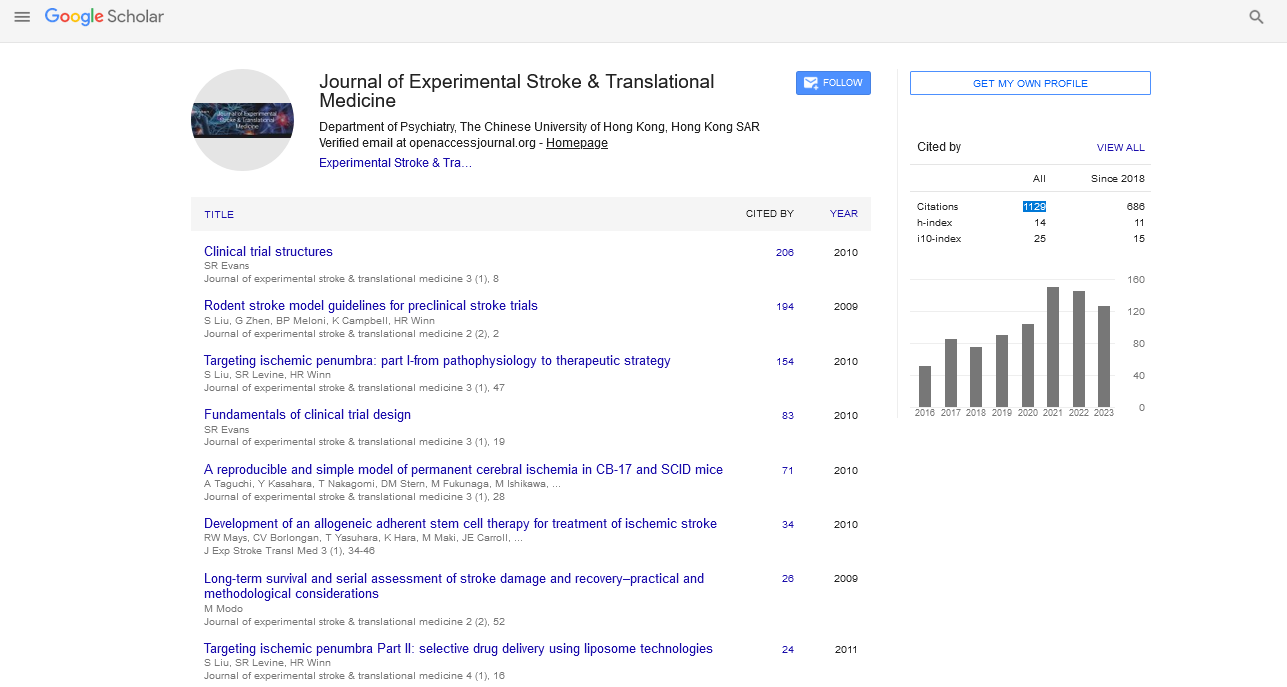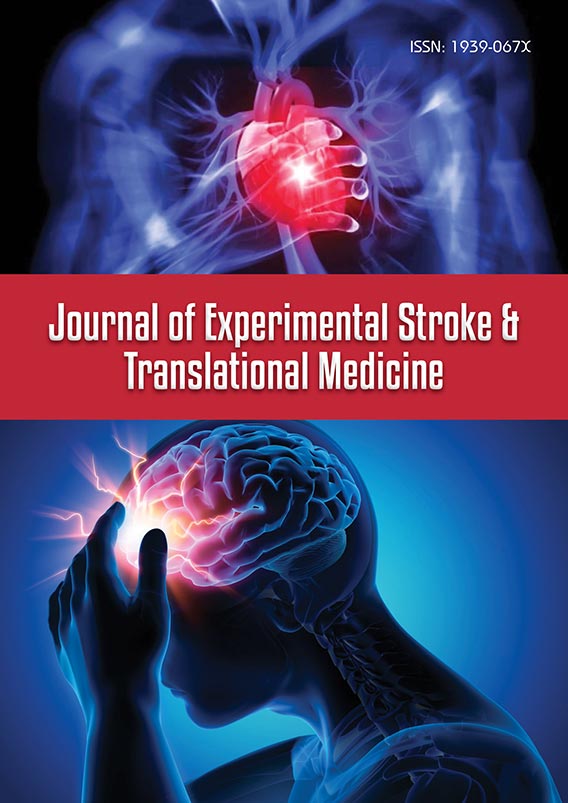Perspective - Journal of Experimental Stroke & Translational Medicine (2024) Volume 16, Issue 3
Bridging Bench to Bedside: Unraveling the Promise of Translational Medicine
- Corresponding Author:
- Arina Danilov
Department of Medicinal Chemistry,
University of Stefhella,
Southampton,
United Kingdom
E-mail: arinadanil@unid.uk
Received: 04-May-2024, Manuscript No. jestm-24-133995; Editor assigned: 08-May-2024, PreQC No. jestm-24-133995 (PQ); Reviewed: 22-May-2024, QC No. jestm-24-133995; Revised: 07-Jun-2024, Manuscript No. jestm-24-133995 (R); Published: 14-Jun-2024, DOI: 10.37532/jestm.2024.16(3).209-210
Introduction
In the ever-evolving landscape of biomedical research and healthcare, the journey from bench to bedside represents a formidable yet transformative endeavor. At the heart of this journey lies the field of translational medicine a dynamic discipline that seeks to bridge the gap between basic science discoveries and clinical applications, translating scientific insights into tangible benefits for patients. In this comprehensive exploration, we embark on a journey through the realm of translational medicine, unraveling its underlying principles, methodologies and transformative potential for improving human health and advancing medical practice.
Description
Understanding translational medicine
Translational medicine represents a multidisciplinary approach to biomedical research and healthcare delivery, encompassing the seamless integration of basic science, clinical research and patient care. At its core, translational medicine seeks to accelerate the translation of scientific discoveries into novel diagnostics, therapeutics and interventions that address unmet clinical needs and improve patient outcomes. By fostering collaboration among researchers, clinicians, industry partners and regulatory agencies, translational medicine aims to expedite the translation of scientific insights from the laboratory to the clinic, ultimately benefiting patients and society at large.
Key principles of translational medicine
Translational medicine operates on several key principles that guide its approach to research, clinical practice and healthcare innovation. Central to these principles is the concept of bidirectional translation the iterative process of translating insights from basic science research into clinical applications and vice versa. This bidirectional flow of knowledge and expertise enables researchers to identify clinically relevant questions, develop innovative solutions, and validate their efficacy in real-world settings.
Another key principle of translational medicine is the emphasis on interdisciplinary collaboration and team science. By bringing together experts from diverse fields such as biology, medicine, engineering, data science and public health, translational research teams can leverage complementary skills, perspectives and methodologies to address complex biomedical challenges and accelerate the pace of discovery.
Methodologies of translational medicine
Translational medicine employs a variety of methodologies and approaches to translate scientific discoveries into clinical practice. These methodologies encompass the entire spectrum of the translational research continuum, from basic science discovery to clinical implementation and dissemination.
At the preclinical stage, translational researchers employ a variety of experimental models, including cell culture systems, animal models and computational simulations, to elucidate the underlying mechanisms of disease, identify potential therapeutic targets and evaluate the efficacy and safety of novel interventions.
In the clinical research phase, translational investigators conduct rigorous clinical trials and observational studies to assess the safety, efficacy and effectiveness of promising interventions in human populations. These studies may involve diverse methodologies, including randomized controlled trials, cohort studies, case-control studies and pragmatic trials, depending on the research question and study design.
Applications of translational medicine
Translational medicine holds immense promise for addressing some of the most pressing challenges in healthcare, from the development of new therapies for cancer, cardiovascular disease and neurodegenerative disorders to the implementation of precision medicine approaches for personalized diagnosis and treatment.
In oncology, translational medicine has revolutionized the landscape of cancer treatment, enabling the development of targeted therapies, immunotherapies and precision medicine approaches tailored to the molecular characteristics of individual tumors. By identifying specific genetic mutations, biomarkers and molecular pathways driving cancer growth and metastasis, translational researchers can develop novel therapeutic strategies that target tumor cells with unprecedented precision, minimizing off-target effects and improving patient outcomes.
In cardiovascular medicine, translational research has led to significant a dvances i n the prevention, diagnosis and treatment of heart disease, including the development of novel biomarkers, imaging techniques and therapeutic interventions. By elucidating the mechanisms of atherosclerosis, thrombosis and myocardial infarction, translational researchers have identified new targets for drug development, devised innovative strategies for revascularization and cardiac regeneration and improved risk stratification and prognostication for patients with cardiovascular disease.
Challenges and future directions
Despite its transformative potential, translational medicine faces several challenges and barriers that must be addressed to realize its full impact on healthcare. These challenges include the need for increased funding and resources for translational research, the complexities of interdisciplinary collaboration and team science and the regulatory and ethical considerations associated with translating novel interventions from the laboratory to the clinic.
Conclusion
As we navigate the frontiers of translational medicine, we are confronted with the immense promise and potential of this dynamic discipline to transform healthcare and improve patient outcomes. By bridging the gap between basic science discovery and clinical application, translational medicine offers a pathway to accelerate the translation of scientific insights into tangible benefits for patients, addressing unmet clinical needs and advancing medical practice.
Through interdisciplinary collaboration, patient-centered research and a commitment to innovation, translational medicine can unlock new frontiers in healthcare, ushering in a future where personalized, precision medicine approaches are the standard of care and where every patient benefits from the latest advances in biomedical science. As we continue to unravel the mysteries of human biology and disease, translational medicine serves as a beacon of hope, guiding us towards a brighter, healthier future for all.

